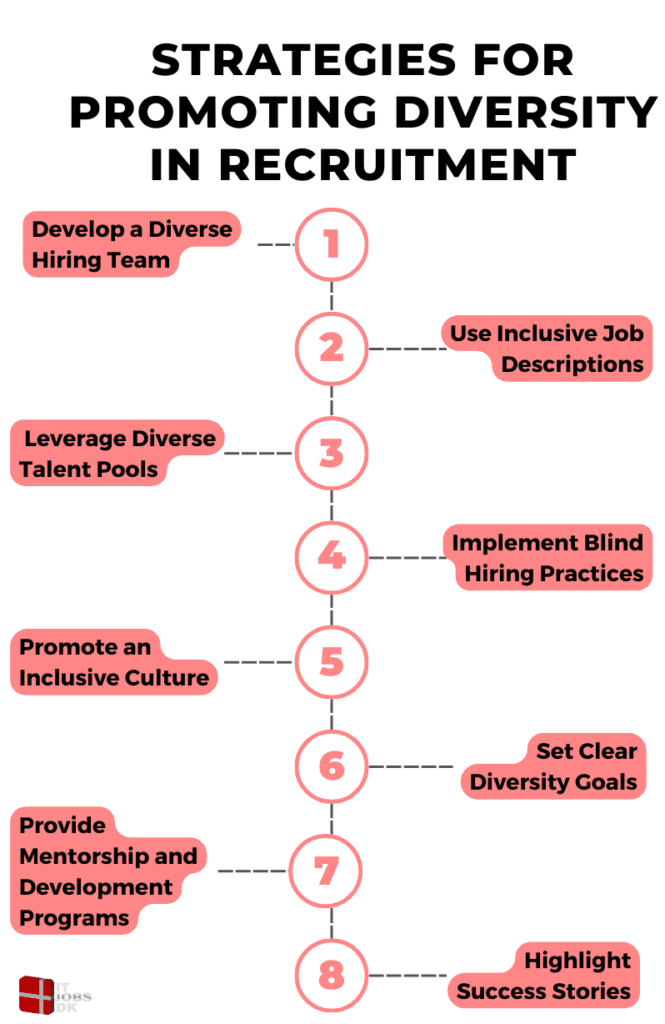
Diversity in recruitment is essential for creating inclusive workplaces. It involves attracting a wide range of candidates from different backgrounds, ensuring everyone has an equal opportunity. By embracing diversity in recruitment process, companies can benefit from varied perspectives, fostering innovation and better decision-making.
For instance, in Denmark IT jobs, a focus on diversity can lead to more dynamic and creative teams. Danish companies are increasingly recognizing the value of diverse teams and are implementing strategies to attract talent from different ethnicities, genders, and age groups. This not only enhances the workplace culture but also improves the company’s ability to understand and serve a diverse customer base.
In conclusion, prioritizing diversity in the recruitment process is a strategic advantage for companies, especially in competitive fields like IT in Denmark. It helps build stronger, more innovative teams capable of driving success in the global market.
The Benefits of Diversity in the Workplace
Diversity in the workplace offers numerous benefits, making it a critical aspect of modern business strategy. When companies emphasize diversity and inclusion recruitment, they create environments where different perspectives and ideas thrive. This inclusivity drives innovation and problem-solving, leading to better products and services.
Improved Performance and Innovation: Diverse teams bring a variety of viewpoints, which can lead to more creative solutions. Diversity recruiting in tech, for instance, ensures that companies are better equipped to tackle complex problems with innovative approaches.
Enhanced Employee Engagement: Inclusive workplaces foster a sense of belonging, making employees feel valued and respected. This boosts morale and productivity, as employees are more likely to be engaged and committed to their work.
Broader Market Reach: Companies that prioritize diversity and inclusion recruitment can better understand and cater to a diverse customer base. This is particularly important in global markets where customer preferences vary widely.
Attracting Top Talent: Emphasizing diversity makes a company more attractive to potential employees. Talented individuals want to work in environments where they feel their unique contributions will be valued and their growth supported.
Diversity recruiting in tech and other industries is not just about fairness but about building stronger, more successful organizations. By leveraging the benefits of diversity, companies can enhance their performance, innovation, and market reach.

How to Promote Diversity in Recruitment
Promoting diversity in recruitment requires intentional strategies and practices to ensure a fair and inclusive hiring process. Here are some effective ways to achieve this:
- Implement Unbiased Hiring Practices: To promote diversity in recruitment, it’s essential to eliminate biases from the hiring process. This can be done by using standardized interview questions, blind resume screening, and diverse hiring panels. These steps help ensure that all candidates are evaluated fairly based on their skills and qualifications.
- Broaden Talent Pools: Expanding the sources from which you recruit can significantly enhance diversity. Attend job fairs, partner with diverse professional organizations, and use platforms dedicated to underrepresented groups to attract a wider range of candidates. This approach ensures a more inclusive candidate pool and increases the chances of finding top talent.
- Promote Gender Workplace Diversity: Actively encourage gender workplace diversity by creating supportive environments for all genders. This can involve offering flexible work arrangements, establishing mentorship programs, and setting clear goals for gender balance. These initiatives make your workplace more attractive to a diverse range of applicants. Women hold only 26.7% of tech jobs, while men occupy 73.3% of these positions.

- Provide Diversity Training: Training hiring managers and recruiters on the importance of diversity and inclusion helps them recognize and mitigate their own biases. This training should include practical strategies for promoting diversity in recruitment and fostering an inclusive workplace culture.
- Monitor and Measure Progress: Regularly track and analyze diversity metrics within your recruitment process. This data helps identify areas for improvement and measure the effectiveness of your diversity initiatives. By continually assessing your efforts, you can make informed adjustments to enhance diversity.
In conclusion, promoting diversity in recruitment involves implementing unbiased practices, broadening talent pools, encouraging gender workplace diversity, providing training, and monitoring progress. These steps not only create a more inclusive hiring process but also contribute to a more dynamic and innovative workplace.
Strategies for Promoting Diversity in Recruitment
Promoting diversity in recruitment is essential for creating a more inclusive and innovative workplace. Here are some effective strategies to help achieve this:
- Develop a Diverse Hiring Team: Ensuring that your hiring team reflects a variety of backgrounds can help mitigate biases. A diverse hiring team is more likely to attract and fairly evaluate candidates from different backgrounds, promoting tech companies diversity and inclusion.
- Use Inclusive Job Descriptions: Craft job descriptions that appeal to a wide range of candidates. Avoid gendered language and jargon that might alienate certain groups. Highlight the company’s commitment to diversity and inclusion to attract diverse talent recruitment.
- Leverage Diverse Talent Pools: Reach out to diverse talent pools by partnering with organizations and educational institutions that serve underrepresented groups. Participate in job fairs and networking events that focus on diversity, and use online platforms dedicated to connecting diverse candidates with employers.

- Implement Blind Hiring Practices: Remove identifying information from resumes and applications to focus solely on candidates’ skills and qualifications. This reduces the potential for unconscious bias and ensures a more equitable evaluation process.
- Promote an Inclusive Culture: An inclusive workplace culture is crucial for retaining diverse talent. Offer training on diversity and inclusion, encourage open dialogue about these topics, and establish employee resource groups to support underrepresented employees. Demonstrating a commitment to an inclusive culture makes your company more attractive to diverse candidates.
- Set Clear Diversity Goals: Establish clear, measurable goals for diversity in your recruitment process. Regularly review your progress and adjust strategies as needed to meet these goals. Transparency about your diversity objectives and achievements can also enhance your company’s reputation.
- Provide Mentorship and Development Programs: Offer mentorship programs and career development opportunities for employees from diverse backgrounds. This supports their professional growth and demonstrates your commitment to fostering an inclusive workplace.
- Highlight Success Stories: Share success stories of diverse employees within your organization. This not only showcases your commitment to diversity but also provides role models for potential candidates, encouraging them to apply.
Challenges in Implementing Diversity in Recruitment
Implementing diversity in recruitment can be challenging for many organizations. Here are some common obstacles and how they impact the recruitment process:
- Unconscious Bias: Unconscious bias in hiring managers and recruiters can hinder diversity efforts. Even well-meaning individuals may have inherent biases that affect their decisions. Training on recognizing and mitigating these biases is essential to ensure fair evaluations, especially for junior IT job candidates who might be overlooked due to stereotypes.
- Limited Talent Pool: Attracting diverse talent can be difficult if the existing talent pool lacks diversity. This is often seen in fields like tech, where certain demographics are underrepresented. Companies need to broaden their recruitment efforts and actively seek out diverse candidates through partnerships with diverse organizations and educational institutions.
- Resistance to Change: Organizational resistance to change can slow down diversity initiatives. Some employees and managers may not see the importance of diversity or may fear that it threatens their own opportunities. Clear communication about why diversity is beneficial for everyone and fostering an inclusive culture can help mitigate this resistance.
- Inadequate Resources: Implementing effective diversity and inclusion strategies requires resources, including time, money, and personnel. Smaller companies or those with limited budgets may struggle to allocate these resources effectively, impacting their ability to attract and retain diverse talent.
- Measuring Progress: Tracking and measuring the success of diversity initiatives can be complex. Without clear metrics and regular assessment, it is challenging to understand the impact of diversity efforts and identify areas for improvement. Establishing specific goals and using data analytics can help in measuring progress and making informed decisions.
- Retention Challenges: Attracting diverse talent is only part of the solution; retaining them is equally important. Diverse employees may face challenges in the workplace, such as feeling isolated or encountering microaggressions. Creating a supportive and inclusive work environment is crucial for retaining diverse talent.
- Legal and Compliance Issues: Navigating legal requirements and ensuring compliance with diversity and inclusion laws can be complex. Companies need to be aware of relevant regulations and implement policies that align with legal standards while promoting diversity.
Promoting diversity in recruitment is crucial for building a strong and innovative workforce. However, it comes with several challenges. Addressing unconscious bias, expanding the talent pool, overcoming resistance to change, allocating resources, measuring progress, retaining diverse talent, and navigating legal issues are all critical steps. Understanding why is diversity recruitment important can help companies tackle these challenges head-on, creating a more inclusive and dynamic workplace.
Embrace Diversity and Inclusion in Recruitment
Are you ready to build a stronger, more innovative workforce? Start by promoting diversity and inclusion in your recruitment process. By addressing unconscious bias, broadening your talent pool, and fostering an inclusive culture, you can attract and retain top talent from diverse backgrounds. Understanding why diversity recruitment is important will help you overcome challenges and create a more dynamic workplace.


 Previous Post
Previous Post Next Post
Next Post